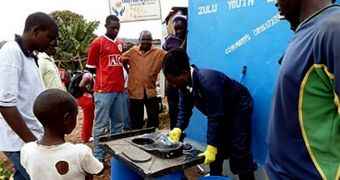Researchers in the United States are proposing a new approach to sanitizing the areas in which more than 2.6 billion people live in unimaginable conditions. The team says that a total revamp of the value chain behind the sanitation chain is needed, and provides solutions in this matter.
The people who are now living without proper access to sanitation make up more than a third of the entire population living on Earth. The densely populated urban slums of Kenya, for example, contain more than 10 million such cases.
In these regions, international relief workers have created critical, but primitive infrastructure for sanitation. Open pit latrines – holes in the ground surrounded by a shack – are common place, but they are used by as much as 150 people.
Without proper funding, the structures get damaged, and many people use the outdoors for basic physiological needs, contaminating groundwater, and making it unsafe to drink for others as well.
What researchers at the Massachusetts Institute of Technology (MIT) are proposing to address this issue is changing the very processes involved in the production of goods and the providing of services related to sanitation.
The idea was developed by MIT Sloan School of Management students David Auerbach and Ani Vallabhaneni, who already started a company called Sanergy. They firm will develop methods of improving sanitation conditions.
At the same time, the goal of the venture is to combine that with creating workplaces for the populations, as well as generating revenues. The students therefore developed an integrated approach to addressing the sanitation issue.
The basic unit in their plan is the “sanitation center,” a basic, modular structure that would take less than $200 apiece to build. The team envisions thousands of such centers being sent to the regions that are in most need.
People in these areas will get unrestricted access to the facilities for a $1 monthly fee. The centers will each contain a clean and safe toilet, where operators will sell related products, including toilet paper, soap and other such things.
Local entrepreneurs will be able to franchise the centers, which means that the measure will also provide incentives for the facilities to be maintained in a good state. They will also generate revenue for the local population in the process.
Furthermore, the collected wastes can then be transported to special processing facilities, which would use a process called anaerobic digestion to convert them into biogas. This compound is made up of carbon dioxide and methane.
The stuff will then be sold for heating and cooking. Methane can also be used to produce electricity, while other leftover from the process can be turned into fertilizers. All products can then generate additional revenues on the market, for very low production costs.
“This is about building a sustainable business model,” Vallabhaneni sums up.

 14 DAY TRIAL //
14 DAY TRIAL //